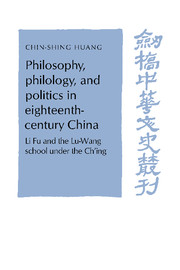 Philosophy, Philology, and Politics in Eighteenth-Century China
Philosophy, Philology, and Politics in Eighteenth-Century China Book contents
- Frontmatter
- Contents
- Foreword by Professor Ying-shih Yü
- Acknowledgments
- Abbreviations
- Introduction
- 1 The original argument (1): “Chu Hsi versus Lu Hsiang-shan” (Chu-Lu i-t'ung): A philosophical interpretation
- 2 The original argument (2): Wang Yang-ming and the problematic of “Chu Hsi versus Lu Hsiang-shan”
- 3 The critical dimension in the Confucian mode of thinking: The conception of the Way as the basis for criticism of the political establishment
- 4 Li Fu: an exemplary Lu-Wang scholar in the Ch'ing dynasty (1): His life
- 5 Li Fu: an exemplary Lu-Wang scholar in the Ch'ing dynasty (2): His thought
- 6 Li Fu and the philological turn
- 7 The price of having a sage-emperor: the assimilation of the tradition of the Way by the political establishment in the light of the K'ang-hsi emperor's governance
- Conclusion
- Chinese glossary
- Bibliography
- Index
Foreword by Professor Ying-shih Yü
Published online by Cambridge University Press: 17 September 2009
- Frontmatter
- Contents
- Foreword by Professor Ying-shih Yü
- Acknowledgments
- Abbreviations
- Introduction
- 1 The original argument (1): “Chu Hsi versus Lu Hsiang-shan” (Chu-Lu i-t'ung): A philosophical interpretation
- 2 The original argument (2): Wang Yang-ming and the problematic of “Chu Hsi versus Lu Hsiang-shan”
- 3 The critical dimension in the Confucian mode of thinking: The conception of the Way as the basis for criticism of the political establishment
- 4 Li Fu: an exemplary Lu-Wang scholar in the Ch'ing dynasty (1): His life
- 5 Li Fu: an exemplary Lu-Wang scholar in the Ch'ing dynasty (2): His thought
- 6 Li Fu and the philological turn
- 7 The price of having a sage-emperor: the assimilation of the tradition of the Way by the political establishment in the light of the K'ang-hsi emperor's governance
- Conclusion
- Chinese glossary
- Bibliography
- Index
Summary
Li Fu (1675–1750) is practically unknown in the West. Neither is he adequately studied by scholars of his own land in the twentieth century. To the best of my knowledge, it was Liang Ch'i-ch'ao (1873–1929) who, in a series of lectures on Ch'ing intellectual history delivered at Tsing Hua University in 1923, first referred to Li Fu as “the last Neo-Confucian of the Lu-Wang persuasion.” Perhaps inspired by Liang's lecture, my late mentor Ch'ien Mu (1895–1990) devoted a whole chapter to the life and thought of Li Fu in his History of Chinese Scholarship during the Last Three Hundred Years (1937), which remains to this day the most detailed and penetrating account in Chinese.
Li Fu's oblivion in twentieth-century Chinese historiography says a great deal more about the mentality of the historian than the historical reality in which Li Fu found himself. Riding on the tide of nationalism and positivism Chinese historians in modern times are generally biased against Confucian scholars closely associated with the Manchu court and Neo-Confucianism as a philosophical system. As a result, modern research on Ch'ing intellectual history has been heavily focused on the philological turn of the Han Learning at the expense of Neo-Confucianism of both the Ch'eng-Chu and the Lu-Wang varieties. The double identities of Li Fu as a high-ranking official and spokesman for Lu-Wang Confucianism have thus made him low on the historian's list of priorities.
- Type
- Chapter
- Information
- Philosophy, Philology, and Politics in Eighteenth-Century ChinaLi Fu and the Lu-Wang School under the Ch'ing, pp. ix - xvPublisher: Cambridge University PressPrint publication year: 1995


